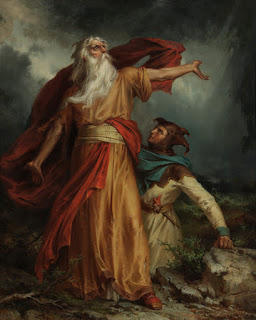Factors that lead to the tragic end of King Lear and Cordelia's life
1. Lear's Fatal Flaw: The Tragic Hubris of Authority
King Lear's tragic end can be attributed, to a significant extent, to his fatal flaw — the unchecked hubris that accompanies absolute authority. Lear's decision to divide his kingdom based on flattery rather than genuine love exposes his misguided belief in his infallibility. The tragic consequences unfold as Lear loses both his kingdom and sanity, showcasing the destructive nature of his pride.
2. Cordelia's Virtue and its Consequences: The Irony of Innocence
Cordelia's role in the tragedy is paradoxical. While her virtue and genuine love for Lear are evident, her refusal to indulge in flattery leads to her banishment. The irony lies in the purity of Cordelia's intentions contributing to the tragic chain of events. Her inability to conform to Lear's expectations sets the stage for her eventual demise, emphasizing the complex interplay between virtue and tragic consequences.
3. The Impact of Betrayal: Machinations of Goneril and Regan
Goneril and Regan, Lear's elder daughters, play a pivotal role in the tragic narrative. Their betrayal, fueled by greed and lust for power, contributes significantly to Lear's downfall. The sisters' manipulation exacerbates Lear's mental deterioration and sets the stage for the tragic events that follow. The deliberate undermining of familial bonds amplifies the tragedy, illustrating the destructive power of betrayal within the kingdom.
4. The Unraveling Mind: Lear's Descent into Madness
As Lear loses his kingdom and faces betrayal, his descent into madness becomes a central element of the tragedy. The unraveling of Lear's mind is not solely a consequence of external factors; it is also a reflection of his own flawed decisions. The storm scene, in particular, becomes a metaphor for Lear's internal chaos, emphasizing the symbiotic relationship between his choices and mental deterioration.
5. Cordelia's Tragic Redemption: A Sacrificial Figure
Cordelia's return to reconcile with Lear showcases her willingness to forgive and mend familial ties. However, her tragic end in captivity underscores the price of virtue in a treacherous world. Cordelia's fate becomes a poignant commentary on the sacrificial nature of goodness in the face of ruthless ambition, contributing to the overall tragic arc of the play.
6. Fate and Divine Justice: The Inescapable Tragedy
While individual choices shape the characters' destinies, the overarching theme of fate and divine justice looms large in the tragedy of Lear and Cordelia. The cosmic forces at play emphasize that, to some extent, their tragic end is preordained. The characters are caught in a web of circumstances that transcend their individual actions, underscoring the inevitability of a tragic conclusion.
In conclusion, the tragic end of Lear and Cordelia is a result of a complex interplay of individual choices, character flaws, betrayal, mental deterioration, and the inescapable forces of fate. Lear's fatal flaw and Cordelia's virtue, while contributing to their respective downfalls, are also intricately connected to external influences and the machinations of those around them. The tragedy of "King Lear" is a tapestry woven with the threads of human folly, moral complexities, and the inexorable march of destiny.
.jpg)

Comments
Post a Comment